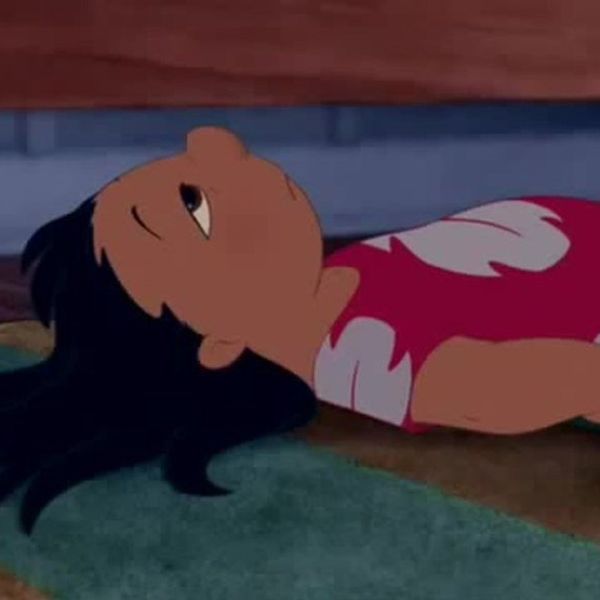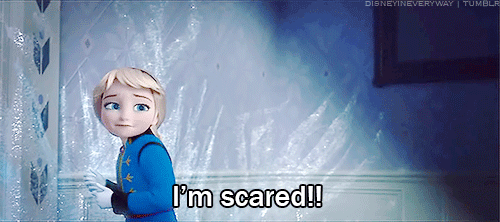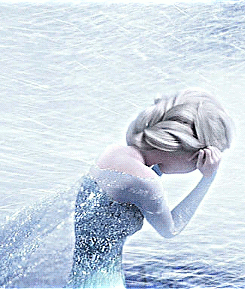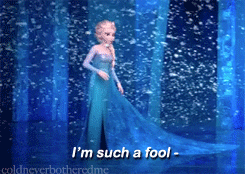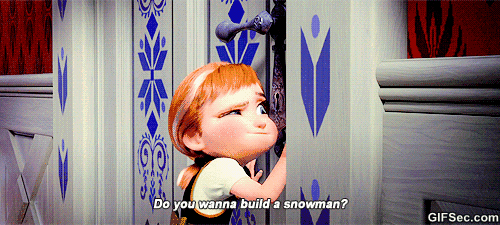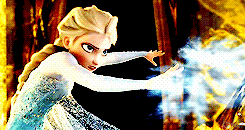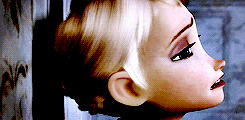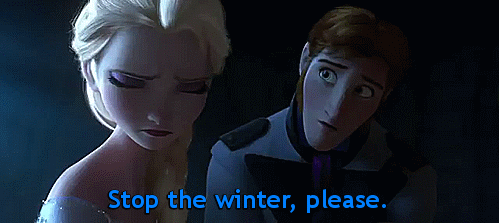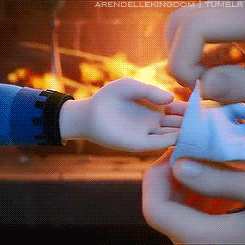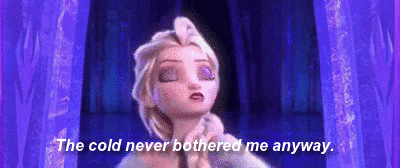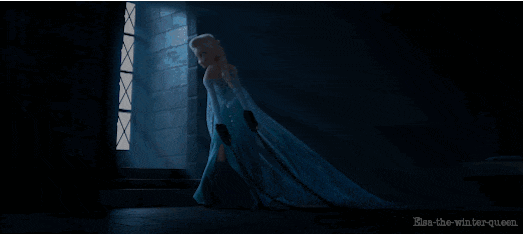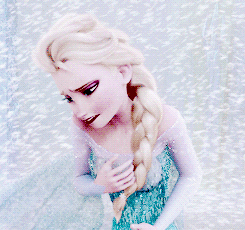"Frozen" is a Disney movie that came out in 2013 and, quite literally, took the world by storm. It is loved by millions of people. If you say you haven't seen it, I'm probably not going to believe you. And if you try to argue with me about the fact that "Frozen" is the best Disney movie ever, hands down, you're probably going to lose. However, while "Frozen" may seem like an extremely entertaining children's movie with catchy and empowering songs, that's just scratching the surface. "Frozen's" underlying theme of depression becomes pretty evident when you really look at it.
First, let's look at the major symptoms of depression that our queen faces. The National Institute of Mental Health lists these symptoms, along with a few of my own:
1. Persistent sad, anxious, or empty mood.
In the beginning of the movie, Elsa accidentally strikes Anna with her ice powers. After this, she tries to seclude herself as best as possible. She lives in a state of constant fear hoping that she can learn to control her power. While she depended on her parents to help her, after their death, she confines herself to her room, afraid of the damage she may be able to cause. This is similar to people suffering from depression. They have a constant state of anxiousness and feel incredibly sad all the time. They fear their depression to the point that they push themselves away to keep from hurting others.
2. Hopelessness and pessimism.
In the beginning of the movie, Elsa never rarely exhibits positive feelings. At her coronation, Anna says, "This is so nice. I wish it could be like this all of the time," to which Elsa responds, "Me too...but it can't." She has already given up hope. She has decided that this is the way things will always be and nothing can change that. Victims suffering from depression have suffered from their depression for so long that they feel like things cannot change. They believe that they will always suffer and they easily lose hope with that kind of mentality.
3. Feelings of guilt, worthlessness, and helplessness.
First of all, Elsa has feelings of intense guilt over harming her sister. That is part of the reason why she hides for so long; she is afraid of hurting her again. She also feels like she can't control her powers. She feels that they have consumed her. When she runs away from Arendelle, she accepts that and is okay with it for a moment. However, when Anna comes back to get her, the song they sing together shows that this acceptance isn't necessarily freedom. She says "I'm such a fool, I can't be free," and when Anna begs for her helps, Elsa ends the song with a rage-filled "I can't," accidentally striking Anna again. Similarly to Elsa's powers, people suffering from depression feel that all they are is their depression and like it consumes them.
4. Loss of interest in pleasure and hobbies.
"Frozen" pretty much devotes an entire song to describing how Elsa doesn't do anything she used to do. Anna begs Elsa to just come out and play because she "never [sees her] anymore." She invites her to build a snowman, ride their bikes, and many other things that they used to do that Elsa just isn't interested in anymore. Depression causes people to not want to do any of the things they used to love. It just makes you want to stay in bed; it wipes you of all mental and physical energy.
5. Restlessness and irritability.
Elsa is easily angered. We see this when Anna tells her that Hans wants to get married. She becomes very upset and begins arguing with Anna. Because of her fear of hurting her sister, she tries to leave, but Anna won't let her. She becomes so upset that all she can do is lash out. When Ann pulls of her only form of safety, her glove, Elsa yells, "I said enough!" and her powers take control, covering the room in ice. People with depression try to contain their feelings of irritability, but when they are pushed too hard, the illness takes control and they lash out, usually with regret afterwards.
6. Seclusion.
When Elsa becomes afraid of her powers, she locks herself into her room, cutting off all of her previous relationships. She is afraid of hurting the people around her because she cannot control her powers. Never knowing who she may hurt next, she just secludes herself so that it won't happen. She has to just sit in her room, hearing her little sister's desperate attempts to rekindle their relationship, only to know that she simply can't have that with her. Depression causes a desire to just be alone, not wanting to be around people or lash out at them.
7. No control over their emotions.
She has many people begging her to stop her powers. Anna begs and pleads for her to just come home. However, Elsa thinks that the powers have consumed her and there will be no relief. She believes that she can never live a normal life. So she pushes these people away, not wanting the pressure of fixing herself if she doesn't know how. However, Anna is desperate to help her beloved sister. She begs, "Please don't shut me out again. Please don't slam the door. You don't have to keep your distance anymore." People with depression tend to push away those who are trying to help them. They don't know how to fix themselves, so they don't want to disappoint the people who want that so dearly.
8. Hiding feelings.
Elsa's gloves become very symbolic in the movie. They symbolize her attempts to conceal her powers. "Conceal, don't feel" becomes her mantra. She feels that if she just pushes the feelings away, she won't have to bother the people around her. Elsa tries to become cold as ice in an attempt to not have to feel these powerful emotions. Pushing away depression can make you feel numb. Also, those suffering from it, don't want to be a burden on their loved ones.
9. Denial.
After the incident at coronation, Elsa tries to accept her powers. She becomes a powerful ice queen and convinces herself she is happy. However, once she learns that everyone isn't better off without her, she finds that not seeing her powers as something she needs to control is not working. Victims of depression may find that ignoring the depression doesn't make anything better. They must recognize that there is a problem and make attempts to fix it, not just revel in it.
10. Feeling trapped.
Elsa feels no control over her ice power. She feels that she has lost herself to it. The queen can't see any way out of her situation. It seems that she will always suffer. In her song with Anna, she cries that there is "no escape from the storm inside." She feels so trapped that she has given up. Depression gives the feeling that there is nothing outside of depression. It makes you believe that that is all you know and there's nothing you can ever do about it.
11. Suicide attempts.
While Elsa never actually attempts suicide, her escape to live on her own is comparable. She becomes so overwhelmed and empty of hope, that she believes that it is her own option. She sings, "I may be alone, but I'm alone and free." Elsa see this as the only escape from her depression. It is an overwhelming feeling, and unfortunately people feel that suicide is their only way out. This is not true.
So what can we learn from all of this? What is Disney trying to tell us? By showing us that even Disney princesses feel sadness, they are providing a way to show that these feelings are okay and that you can ask for help. Also, only when Elsa was willing to help herself was she able to gain control of her powers. This shows that when we accept that we need help, we can begin the process of controlling depression. It also shows that our loved ones only want to help, so we should let them in. There's no need to face this on your own. Elsa is an amazing role model who struggles through her issues and decides to help herself. "Frozen" is a beautiful story of how love can overcome depression.
If you or a loved one is suffering from depression, please call 1-800-273-8255.

